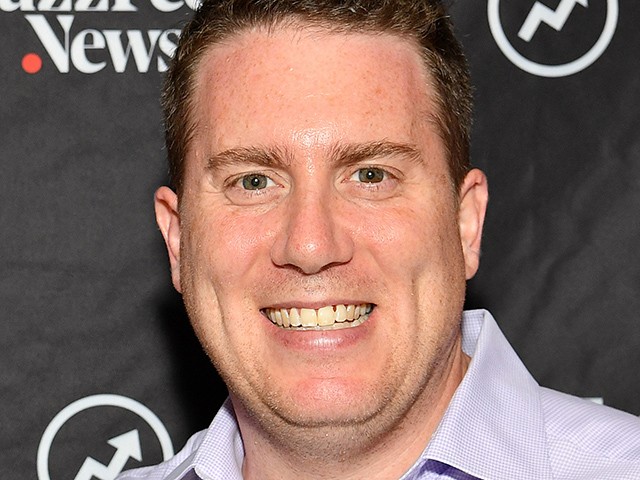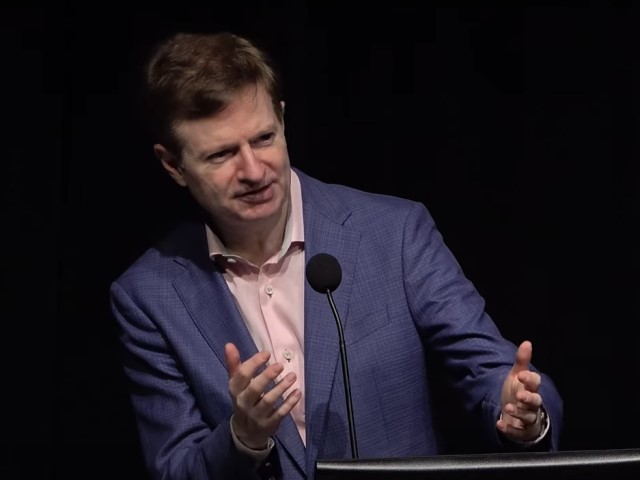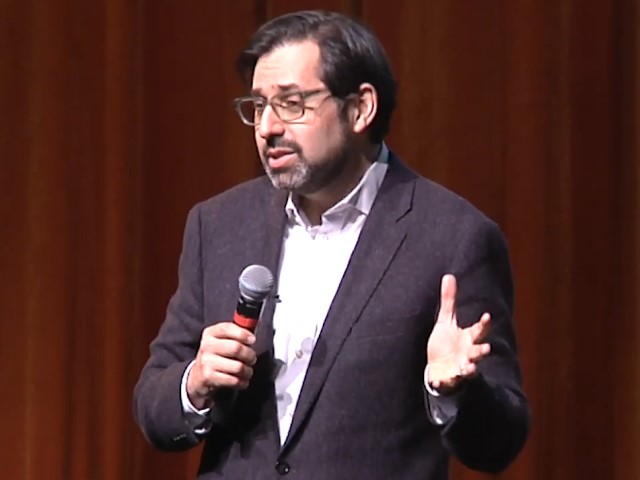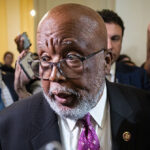
In commemoration of the launch of our first movie, My Son Hunter, I have attempted to find the origins of the contagion that is Hunter Biden laptop denial.
It was one of the biggest stories of the century, broken in one of the country’s oldest papers (the New York Post), and by a terrific reporter (Breitbart’s own Emma-Jo Morris). In an era of endless spin and fake news, this story was 100% factual. Yet it was almost instantly dismissed as Russian disinformation and censored from the Internet.
Who was behind this massive hoax? How did they pull it off? Were these people conspiracists, liars, ignoramuses, or some combination thereof? These are big questions that I can’t fully answer here, but I do think it’s a good time to look back and consider who were the biggest laptop deniers in our establishment media. Here they are:
1. Natasha Bertrand, Politico
Politico’s Natasha Bertrand published the now-infamous letter from over 50 former intelligence officials declaring the laptop “Russian disinformation.”
This article became the centerpiece of the effort to marginalize and discredit the laptop and the reporting of the New York Post. Though the letter suggested that the laptop narrative merely had the hallmarks of disinformation (read: she had zero actual evidence it was Russian or disinformation), the piece reverberated throughout the media and political landscape.
Because sometimes in the era of weaponized fake news, blatant speculation = “fact.”
The letter, given to Politico by an aide to disgraced ex-CIA chief and Russia-collusion hoaxer John Brennan, became the go-to excuse for censoring the laptop.
While outlet after outlet continued bandying this excuse, one of Politico’s own reporters was able to independently confirm some of the laptop’s content while all this was going on.
Bertrand, who was also one of the establishment media’s most hysterical Russia-collusion hoaxsters, failed upward from Politico to CNN.
2. The New York Times
When news of the laptop broke, the New York Times, which had (somewhat surprisingly) previously reported on Hunter Biden’s scandals, chose to cover the laptop primarily as a media story.
Right away, the paper published a multi-byline Q&A from its politics team assessing the reporting based on the laptop, declaring, “There is no evidence that the former vice president was involved in or profited from a joint venture pursued by his son and brother.” What a relief! Good thing we can always, always, always trust the New York Times.
The same day, they dispatched media columnist Ben Smith to tackle the press’s handling of the laptop and claims from former Hunter Biden business partner Tony Bobulinski. Smith seemed more concerned with the credibility of Rudy Giuliani (who “cast a pall over the story,” according to Smith) and Bobulinski than whether or not the laptop itself might be a trove of blockbuster revelations. This tactic, known as BenSmithing, is Smith’s specialty.
The Times also published a column at the time the Post published the “Laptop from Hell” series, calling the report “questionable,” “unverified,” and “baroque mythology.” Now THAT’S how you do journalism.
The Times published another column by Ross Douthat, the Times’s version of a conservative, on October 27, 2020, explicitly describing how the paper worked to ignore the substance of the Hunter Biden laptop story as part of covering it in a “cautious fashion,” even after Hunter’s business associate, Tony Bobulinski, came out on the record to confirm “The Big Guy” who was cut in on the deal was, in fact, Joe Biden.
“[T]his newspaper covered the story in a dry and cautious fashion, describing the Bobulinski allegations while also stressing the lack of definite evidence of the former vice president’s involvement in any deal,” Douthat wrote for the Times.
When, nearly 18 months later, the Times reporters affirmed the authenticity of the laptop, Smith was already off on his next venture, Biden was in the second year of his presidency, and NYT readers had moved on to the next hysteria du jour.
3. Glenn Kessler, the Washington Post
When news of the laptop first broke, Washington Post fact-checker Glenn Kessler dashed off a blog post on the laptop controversy titled “Hunter Biden’s alleged laptop: An explainer.”
The piece offered Team Biden’s take on the controversy and (are you sitting down?) tried to poke holes in the New York Post’s reporting. But nothing was noted about the body of already-available info that confirmed the laptop’s contents.
Kessler eventually acknowledged in 2022 that at least portions of the laptop were real, but he continued to present claims from Team Biden as fact while failing to present contradictory evidence that was available from the laptop itself. Kessler has used his position at WaPo to declare certain lines of inquiry out of bounds for respectable journalists, continuing to take the word of the Biden machine over the evidence.
Time and time again, Kessler has shown that he’s more interested in policing the lines of legitimate inquiry than engaging in substantive “fact-checking.”
4. Anne Applebaum, the Atlantic
Perhaps no publication has embarrassed itself more in recent years than the Atlantic. One example is from 2017, when the Secret Service itself took to Twitter to chastise their Washington editor for a series of factually inaccurate tweets. Another occurred in 2020 when the magazine pushed a hoax claiming that Trump insulted U.S. soldiers during a trip to France. (I documented this incident thoroughly in my book on weaponized partisan media, Breaking the News.)
Never sensitive to irony, the Atlantic hosted a forum on disinformation earlier this year. The magazine had little to say about its own track record and even less about Biden’s laptop.
Nonetheless, staff writer Anne Applebaum, one of the greatest peddlers of Russiagate nonsense, was asked about the laptop during the event. Having lost her previous go-to excuse (disinformation), Applebaum said she simply found the laptop uninteresting.
[embedded content]
5. Brian Stelter, CNN
Almost as soon as it appeared in the media, former CNN media critic Brian Stelter used his platform—Reliable Sources, the most famous media watchdog show on television—to baselessly attack the credibility of the Hunter Biden laptop reporting.
Oct. 18: CNN’s @brianstelter calls the NY Post’s Hunter Biden scoop just “political entertainment,” a “conspiracy” pic.twitter.com/v1BmNoGkvu
— Tom Elliott (@tomselliott) December 10, 2020
When the New York Times (finally) affirmed the laptop’s contents, Stelter still devoted no time to covering the story and refused to retract previous claims. Stelter even denied—at the Atlantic’s disinformation forum (obviously)—that he called the Biden laptop disinformation.
Freshman Christopher Phillips CALLS OUT Brian Stelter and CNN for being a “purveyor of disinformation.” He points to the Russian collusion hoax, Jussie Smollett, the smears of Justice Kavanaugh and Nick Sandmann, and their dismissal of Hunter Biden’s laptop. pic.twitter.com/eHxqAWqVSC
— Nicholas Fondacaro (@NickFondacaro) April 7, 2022
6. Ken Dilanian, NBC News
Dilanian, NBC’s justice and intelligence correspondent, complained that his attempts to obtain the laptop were rebuffed — but admitted he was shown documents that appeared to be genuine. Still, he repeated baseless speculation that the laptop was likely the result of a foreign intelligence operation. His logic appeared to be that he needed a full forensic analysis before he would report on the laptop’s contents, but he was more than willing to peddle the idea that the laptop is the result of a Russian op without any evidence whatsoever.
13) MSNBC’s @KatyTurNBC & @KenDilanianNBC were likewise happy to see the NY Post’s “dangerous” reporting buried just weeks before the election pic.twitter.com/jHFYYmFptA
— Tom Elliott (@tomselliott) September 21, 2021
“Obviously, Russia would be the chief suspect there,” according to Dilanian. Perhaps he was the one engaged in a disinfo campaign.
7. NPR
NPR published a hit piece on now-Breitbart News Politics Editor Emma-Jo Morris, the author of the Post’s “Laptop from Hell” series, which the publicly funded outlet then used to justify refusing to cover the story.
In a newsletter (written by Poynter media institute’s Kelly McBride), NPR explained to its readers, “There are many, many red flags in that New York Post investigation. NPR Media Correspondent David Folkenflik detailed most of them here,” linking to an article by NPR’s media reporter headlined, “Questionable ‘N.Y. Post’ Scoop Driven By Ex-Hannity Producer And Giuliani.”
NPR then used the claim the Post’s reporting was “Russian disinformation” to further justify their decision, saying the laptop’s contents “don’t amount to much.”
“We don’t want to waste our time on stories that are not really stories, and we don’t want to waste the listeners’ and readers’ time on stories that are just pure distractions,” NPR Managing Editor for News Terence Samuel said.
So, the business model at NPR, apparently, is to take your tax dollars to do “journalism,” only to tell you they don’t need to waste your time by doing actual journalism because it would distract you. Brilliant!
8. Social Media Juggernauts
Without a doubt, the most odious laptop deniers were the executives at Twitter and Facebook. Their implicit—and occasionally explicit–threat to shut down traffic to organizations who dared to report the laptop marked a new era of censorship in America.
The largest “town squares” on Earth were instrumental in shutting down the spread of 100% factual information unfavorable to a major political family.
Jack Dorsey even admitted that there was no evidence to back up Twitter’s decision to lock the New York Post’s account and to algorithmically slow the spread of the factual stories.
In 2022, Mark Zuckerberg also copped to the censorship, only he blamed the decision on an FBI warning to be on the lookout for foreign propaganda dump. But it was Facebook’s own team that decided—without evidence—to memory hole the biggest story of the election cycle.
HONORABLE MENTIONS
The 50+ former intelligence officials who claimed the laptop was part of a disinformation campaign: James Clapper, Michael Hayden, Leon Panetta, John Brennan, Thomas Finger, Rick Ledgett, John McLaughlin, Michael Morell, Mike Vickers, Doug Wise, Nick Rasmussen, Russ Travers, Andy Liepman, John Moseman, Larry Pfeiffer, Jeremy Bash, Rodney Snyder, Glenn Gerstell, David B. Buckley, Nada Bakos, Patty Brandmaier, James B. Bruce, David Cariens, Janice Cariens, Paul Kolbe, Peter Corsell, Brett Davis, Roger Zane George, Steven L. Hall, Kent Harrington, Don Hepburn, Timothy D. Kilbourn, Ron Marks, Jonna Hiestand Mendez, Emile Nakhleh, Gerald A. O’Shea, David Priess, Pam Purcilly, Marc Polymeropoulos, Chris Savos, Nick Shapiro, John Sipher, Stephen Slick, Cynthia Strand, Greg Tarbell, David Terry, Greg Treverton, John Tullius, David A. Vanell, Winston Wiley, Kristin Wood, and 9 additional former intelligence officials who declined to be named.
Network news talking heads who openly, but baselessly, conjectured that the laptop was fake: Erin Burnett, Wolf Blitzer, Joe Scarborough, Jonathan Lemire, and many, many more!
Who am I missing? Leave a link in the comments!
Hunter Biden is the subject of a brand new narrative film, My Son Hunter, marking Breitbart’s expansion into film distribution. The film was directed by Robert Davi (Goonies, License to Kill, Die Hard) and stars Laurence Fox (Victoria, Inspector Lewis, The Professor, and The Madman) as Hunter Biden; Gina Carano (The Mandalorian, Dead Pool, Heist) as a Secret Service agent; and John James (Dynasty) as Joe Biden. It was produced by Phelim McAleer and Ann McElhinney (Gosnell movie, FBI Lovebirds: Undercovers) from the Unreported Story Society. The film is available RIGHT NOW for Streaming and Downloading at MySonHunter.com. The trailer below has been viewed almost 5 million times across social media.
[embedded content]
Alex Marlow is the Editor-in-Chief of Breitbart News, the host of Breitbart News Daily on SiriusXM’s Patriot Channel 125, and the author of the bestselling book, Breaking the News: Exposing the Establishment Media’s Hidden Deals and Secret Corruption. You can follow Alex on Facebook, Instagram, and Twitter at @AlexMarlow.










